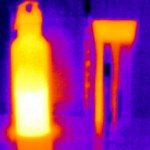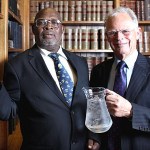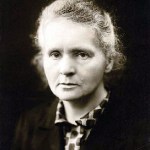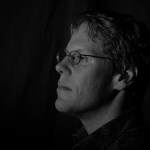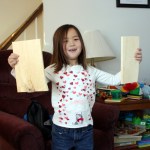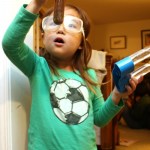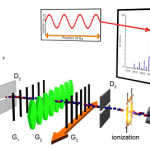Chemistry
One of my favorite Christmas presents this year was a Seek Thermal camera to use with my Android phone. This allows for a lot of idle physics-y fun, taking pictures of things in thermal mode.
One idea I had was to do a sort of follow-up to the test of my insulated mug that I did a couple of years ago with a PASCO thermocouple probe. That showed a really dramatic difference between my metal IQC water bottle and the insulated mug, in terms of the rate at which hot water placed in each cooled. So, how do these look in thermal imaging?
Well, I took my insulated mug (actually a different one than…
Another weekend day, another story I'm going to outsource a bit. In this case, to the original scientist, who at the time of his discovery was a 13-year-old schoolboy in Tanzania:
In 1963, when I was in form 3 in Magamba Secondary School, Tanzania, I used to make ice-cream. The boys at the school do this by boiling milk, mixing it with sugar and putting it into the freezing chamber in the refrigerator, after it has first cooled nearly to room temperature. A lot of boys make it and there is a rush to get space in the refrigerator.
One day after buying milk from the local women, I started…
There's no way I could possibly go through a long history-of-science blog series without mentioning the great Marie Skłodowska Curie, one of the very few people in history to win not one but two Nobel Prizes for her scientific work-- if nothing else, Polish pride would demand it. She made a monumental contribution to physics through her work on radioactivity (and through being nearly impossible to kill-- while her work on isolating radium made her ill for many years, she outlived an amazing number of her assistants...), and there are a lot of great stories about her.
This series is partly…
Borne of the flowing water (...)
Tenderly cared for by the Ninhursag,
Borne of the flowing water (...)
Tenderly cared for by the Ninhursag,
Having founded your town by the sacred lake,
She finished its great walls for you,
Ninkasi, having founded your town by the sacred lake,
She finished its great walls for you
Your father is Enki, Lord Nidimmud,
Your mother is Ninti, the queen of the sacred lake,
Ninkasi, Your father is Enki, Lord Nidimmud,
Your mother is Ninti, the queen of the sacred lake.
You are the one who handles the dough,
[and] with a big shovel,
Mixing in a pit, the bappir with…
I've decided to do a new round of profiles in the Project for Non-Academic Science (acronym deliberately chosen to coincide with a journal), as a way of getting a little more information out there to students studying in STEM fields who will likely end up with jobs off the "standard" academic science track.
Eighth in this round is Grant Goodyear, who started life as a theoretical chemist, and now does nuclear physics in the oil industry.
1) What is your non-academic job? These days I'm a nuclear physicist who works on the design and characterization of nuclear well-logging tools that are used…
I've seen a few links passed around to this Tom Siegfried post about science literacy, which is mostly a familiar story about how polls show most Americans giving incorrect answers to science questions. The sort of stuff you find in the NSF's Science and Engineering Indicators report. What's getting the social-media attention, though, is this paragraph near the end:
In fact, I’d contend (and have contended) that the problem with science education is not that it fails to inculcate enough facts, but that it tries to inculcate too many. Science classes in high school and intro classes in…
"Daddy? How do you make water?"
"You mean, what is it made of?"
"Yeah, what's water made of?"
"Hydrogen and oxygen."
"Oh. And what's hydrogen and oxygen?"
"They're chemical elements."
"So, when we drink water, we're drinking chemicals?"
"Well, yeah. In a sense, everything is chemicals. Water's a chemical, air is made of chemicals. "
"What about, like, wood?"
"Chemicals."
"What?!?! Is everything chemicals?"
"Pretty much, yeah."
"What about lights?"
"Light isn't a chemical, but the things that make light are made out of chemicals."
"Yeah, like, the Sun is fire, and it makes light, but is the…
Dmitrii Ivanovich Mendeleev hit on the idea of the Periodic Table as an organizing theme for a textbook he began writing in 1868. He did some work on refining the idea, and in 1870 presented a paper on it to a meeting of the Russian Chemical Society.
Well, actually, that's not quite true-- Mendeleev did write up a paper for Russian chemists in 1870, but he didn't present it himself. He had a friend do the presentation in his stead. Mendeleev himself was out of town, inspecting artisanal cheese-making operations for the Russian government.
I talked a bit last week about Eureka moments and…
One of SteelyKid's classmates came over for a couple hours today. After a bit, they got into the Magic School Bus science kit she got for her birthday, and decided to invent "new kinds of water." The "featured image" above shows her reinventing stock images... And doing a better job of it than this clown. If you need an image to illustrate your chemistry story, shoot me an email-- our rates are very reasonable.
(The sludgy brown mixture in the tube is water with soap, cinnamon, and cracked pepper floating in it. If you shake it back and forth a bit, the pepper does float around in a kind of…
I'm teaching Quantum Optics this term, and one of my students picked "Atom Optics" off the list of suggested paper topics. When he asked for pointers, I said "You should check out the diffraction stuff Markus Arndt's group does." And just like that, a paper from the Arndt group turns up from the Arxiv Blog...
This is apparently only recently posted to the arxiv, though the article in Physical Chemistry Chemical Physics claims to have been online since July. Since I never get tired of talking about this, let's talk about this one, too.
So, what's this one about, then? In a lot of ways, it's…
Yesterday's post about differences between intro physics and chemistry sparked an interesting discussion in comments that I didn't have time to participate in. Sigh. Anyway, a question that came up in there was why we have physicists teach intro physics courses that are primarily designed to serve other departments.
It's a good question, and in my more cynical moments, I sort of suspect it's because engineering faculty are canny enough to outsource the weeding-out of the students who can't hack it in engineering. But I think there are good reasons, particularly at a liberal arts school like…
Not long ago, I had a meeting with the Dean, who is a chemist. One of the things I talked about was my plan for distributing teaching assignments in the next few years, which ran into an interesting cultural difference. I explained how I was trying to make the distribution of assignments a little more regular and uniform, getting everybody to teach both intro and upper-level courses, and he said (paraphrased), "That's funny. We never have a problem with that in chemistry-- the organic chemists teach Orgo, and the rest of us teach general chemistry, and that's that."
It took me a minute to put…
(This post is part of the new round of interviews of non-academic scientists, giving the responses of Richard Lobinske, a Hazardous Waste Manager (meaning he handles chemicals, such as these decades-old pesticides, not particularly noxious low-level employees). The goal is to provide some additional information for science students thinking about their fiuture careers, describing options beyond the assumed default Ph.D.--post-doc--academic-job track.)
1) What is your non-academic job?
Hazardous Waste Manager. I oversee a county household hazardous waste collection program that also handles…
(This post is part of the new round of interviews of non-academic scientists, giving the responses of Amy Young, who runs her own soap-making business. The goal is to provide some additional information for science students thinking about their fiuture careers, describing options beyond the assumed default Ph.D.--post-doc--academic-job track.)
1) What is your non-academic job?
The relevant part of my work is as partner and chief developer/producer at Foam on the Range, which makes and sells soaps, lotions, and other bath/cosmetic-type products. My business cards say "Saponifier in Chief". It'…
Last summer, there was a fair bit of hype about a paper from Mark Raizen's group at Texas which was mostly reported with an "Einstein proven wrong" slant, probably due to this press release. While it is technically true that they measured something Einstein said would be impossible to measure, that framing is a little unfair to Einstein. It does draw media attention, though...
The experiment in question involves Brownian motion, and since I had to read up on that anyway for something else, I thought I might as well look up this paper, and write it up for the blog.
OK, so what did they do that…
I'm going to be at a media training session for most of the day. I had hoped to have a long and silly post about physics to schedule today, but, well, that didn't happen. So here's a silly poll to pass the time.
The name of element number 13, chemical symbol Al, is pronounced with how many syllables?survey software
We normally deal in macroscopic quantities of this one, so quantum superpositions of answers are right out.
The Nobel Prize in Chemistry for 2010 goes to Richard F. Heck, Ei-ichi Negishi and Akira Suzuki for giving people a reason to care about palladium. OK, it might not be the only reason-- I'm not actually sure what palladium is used for other than organic synthesis and cold fusion-- but it's the context in which I'm most likely to hear the element mentioned.
I don't pay that much attention to the Chemistry prize, so my reaction to this was mild surprise that it hadn't already won. Palladium catalyzed reactions turn up often enough when people are talking about making organic molecules for some…
